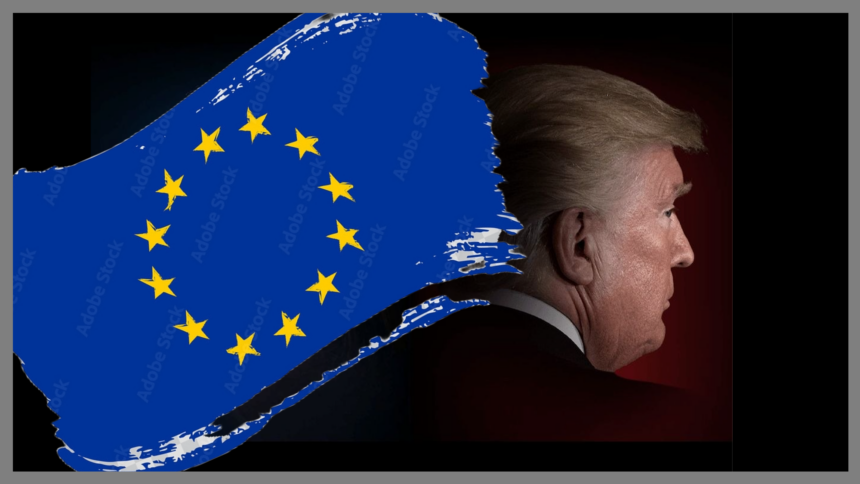As Donald Trump enters his second term as U.S. president, his approach to tech regulation is already causing ripples across the Atlantic. While U.S. tech giants are adjusting to his policies, the European Union (EU) is grappling with its own challenges, particularly in regulating the growing tech sector. Trump’s stance on AI, social media governance, and digital sovereignty is testing the EU’s readiness to protect its digital democracy and market. Let’s dive into the potential impacts on the EU and how it prepares for the shifts brought on by Trump’s policies.
What’s Happening & Why This Matters
Trump’s Influence on U.S. Tech Giants
U.S. Big Tech companies like Meta, Amazon, and Apple have been strengthening their ties with President Trump’s administration ahead of his second term. Since Trump’s election, tech moguls have focused on improving their relationships with the new administration. This is seen as a strategic move to influence U.S. tech policy in a way that is favorable to business interests.
Trump’s presidency is expected to bring a lighter touch to U.S. tech regulation, focusing on innovation rather than heavy-handed restrictions. This contrasts with the EU’s more stringent approach to tech oversight, which includes the Digital Services Act (DSA) and the Digital Markets Act (DMA). These EU regulations curb Big Tech’s power and ensure safer, fairer digital spaces. The difference in approach between the U.S. and the EU highlights a potential clash in global tech governance.
EU’s Tech Regulation: A Tighter Grip on Big Tech
While the U.S. relaxes its regulatory stance under Trump, Europe is moving in the opposite direction. The EU reinforces its regulatory framework to protect citizens from online harm, including disinformation and biased algorithms. The DSA and the AI Act are at the forefront of this effort, providing comprehensive regulations for tech giants operating in Europe.
The EU is particularly focused on holding platforms accountable for content moderation and preventing interference from foreign governments, especially during elections. Recent concerns over foreign influence, such as Elon Musk’s involvement in broadcasting controversial content on X (formerly Twitter), underscored this. The EU has already launched investigations into companies like Meta and X for breaches related to disinformation and the protection of children online.
Henna Virkkunen, the EU Commissioner for tech sovereignty, security, and democracy, has emphasized that the EU will continue to enforce these laws despite the changes in the U.S. leadership. She assures that European laws will remain strong and that investigations into Big Tech will proceed immediately.
The Impact of Trump’s Policies on EU Digital Sovereignty
Trump’s second term could lead to a more relaxed approach to tech regulation globally. This raises concerns in the EU, especially as U.S. companies may use the shifting political landscape to push back against EU regulations. For example, Meta’s recent decision to reduce its fact-checking system in the U.S. is seen as a challenge to the DSA, which mandates transparency and accountability for tech platforms.
Lawmakers in the EU, including MEPs from across the political spectrum, have expressed concern that Big Tech’s influence is growing and that foreign interference could undermine European democratic processes. The EU is committed to holding tech giants accountable, but there are fears that Trump’s policies could weaken the enforcement of these laws and embolden U.S. companies to flout EU rules.
The Future of EU-U.S. Relations in Tech
The shift in U.S. tech policy could strain transatlantic relations, particularly in the tech sector. European officials are already raising questions about the role of U.S. tech moguls in influencing politics. With figures like Elon Musk, Mark Zuckerberg, and Jeff Bezos showing support for Trump, there is growing concern that tech moguls are aligning themselves with U.S. political interests, potentially impacting the integrity of European elections.
The EU is also grappling with the potential consequences of the Biden administration’s AI chip export restrictions, which could limit Europe’s access to advanced U.S. technology. This could force Europe to turn to other markets, such as China, for AI chips, which raises questions about the EU’s digital sovereignty and competitiveness.
TF Summary: What’s Next
As Trump’s second term begins, the EU faces a critical juncture in its efforts to regulate the tech industry. While the U.S. leans toward a more laissez-faire approach, Europe holds firm to its regulatory frameworks, such as the DSA and the AI Act. However, the increasing influence of U.S. tech giants and the potential for weaker enforcement could challenge Europe’s digital sovereignty. The EU must remain vigilant in its regulatory efforts while navigating the growing geopolitical tensions in the tech sector. As both continents adjust to these shifting dynamics, the future of global tech governance remains uncertain.
— Text-to-Speech (TTS) provided by gspeech


